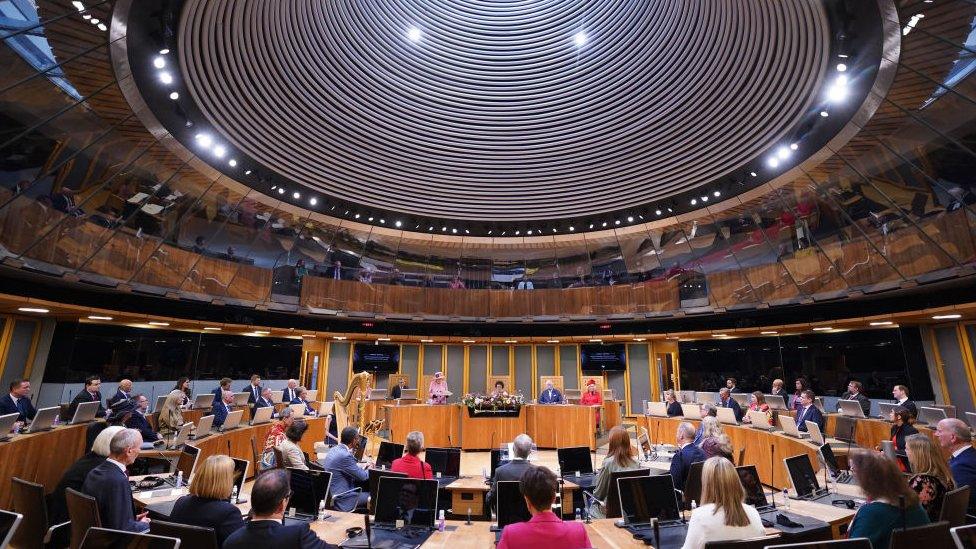Senedd: Welsh Parliament to keep remote working for politicians
- Published

Members of the Senedd (MSs) would be allowed to continue to attend plenary sessions in person or remotely if the vote is passed
The Welsh Parliament is to make remote working arrangements permanent.
Since the beginning of the Covid pandemic in the spring of 2020 the Senedd has allowed politicians to take part from home.
While most politicians now attend in person, supporters said remote working makes the institution more accessible for those with caring responsibilities.
But the Tories say Wales elects people "to represent them in the Senedd, not to represent them from their sofa".
But with Labour and Plaid Cymru supporting the plans, which were backed in the Senedd in a vote on Wednesday, 38 for, 14 against.
At the height of the early pandemic in 2020 the Senedd ceased meeting in person and turned to fully virtual sessions, using Zoom.
It later moved to a hybrid format, where members of the Senedd (MSs) could attend in limited numbers.
After returning to fully virtual proceedings for a short period last winter, restrictions were eased on how many politicians could go to the Welsh Parliament.
Remote working and voting was due to end in August, but after a review senior Senedd members on the cross-party business committee proposed allowing MSs to continue to join debates and committees remotely.
The review sought views from the politicians involved - those in favour said it could help attract more diverse people to serve as MSs, but there were concerns it could affect the quality of debates and scrutiny.
'Being in Cardiff for everything is hugely challenging'
Heledd Fychan, Plaid Cymru Senedd member for South Wales Central, said she had regularly used remote working for childcare reasons, like when her son has been ill.
"Being physically present in Cardiff for everything can be hugely challenging for people with caring responsibilities, or live far away or have a physical disability," she said.
"This means that many people who would make excellent representatives don't stand for election."
Hefin David, Caerphilly Labour MS, is a dad of two children, one of whom is autistic.
He said the hybrid system meant he could attend committees straight from the school run, whereas if he had to go to Cardiff he would miss the session.
"From the point of view of a single father, I find it much easier to be closer to my children's school... than if I had to come in".
"Most members tend to come down anyway - its having that additional flexibility that is used largely when necessary."
'No reason to keep hybrid meetings'
Hybrid arrangements in the House of Commons ended in the summer of 2021, although they are still used in Scotland.
But Welsh Conservative chief whip Darren Millar said: "The people of Wales elect people to represent them in the Senedd, not to represent them from their sofa.
"There is no reason for maintaining hybrid meetings of the Senedd or its committees now that the pandemic has subsided.
"If parliaments elsewhere in the UK and around the world are able to meet fully in person then we should too."

BBC WALES INVESTIGATES: The subjects affecting the lives of people in Wales
BROTHERS IN DANCE: The remarkable duo at the forefront of UK dance

Related topics
- Published16 February 2022

- Published2 July 2022

- Published7 June 2022
